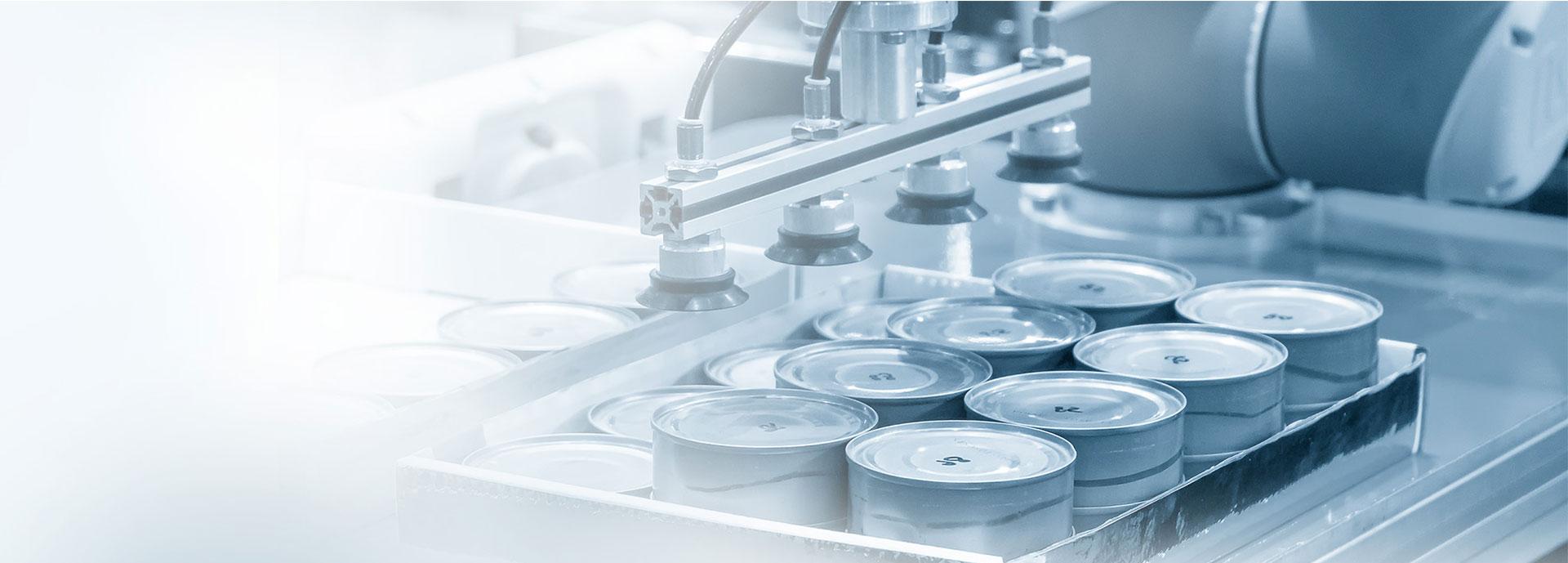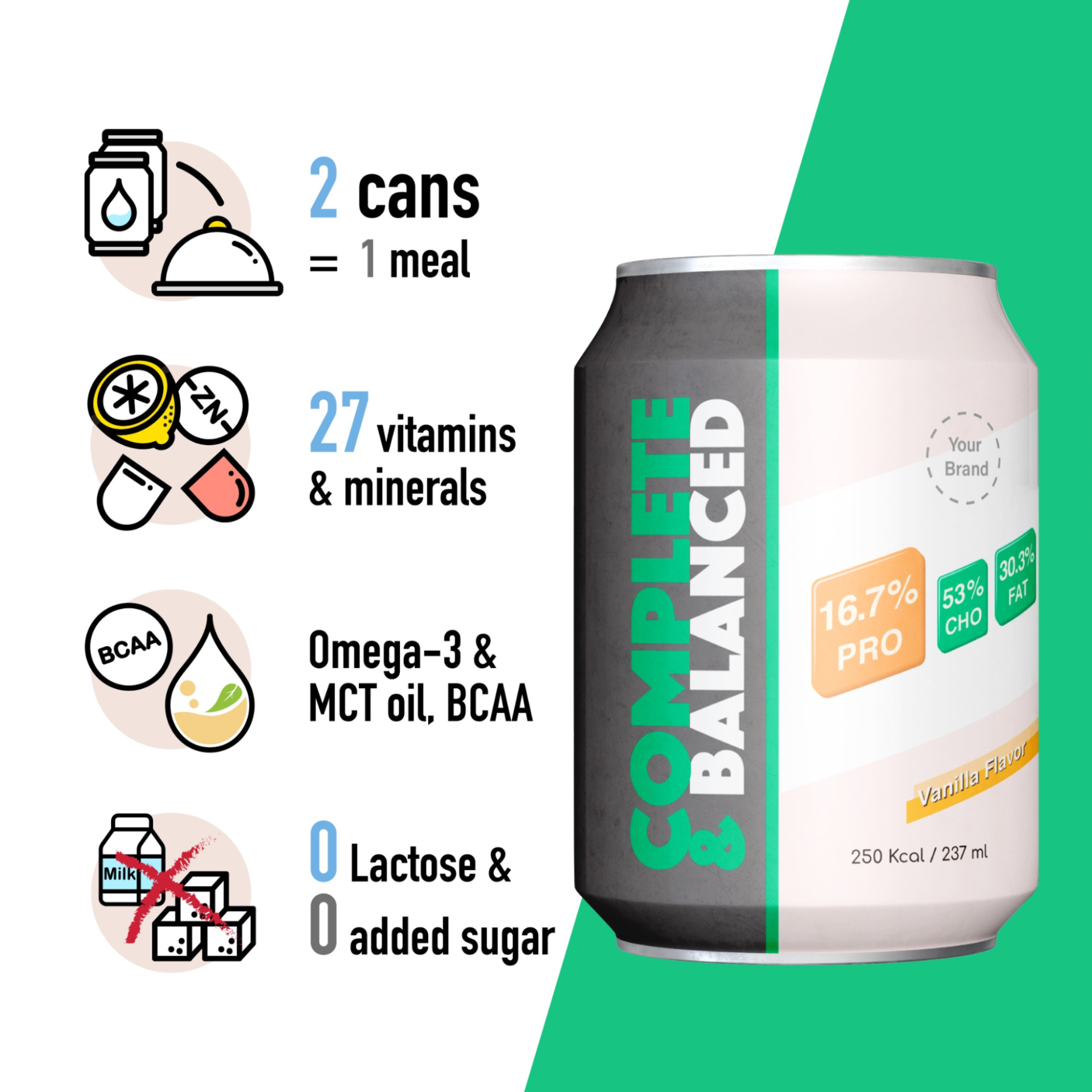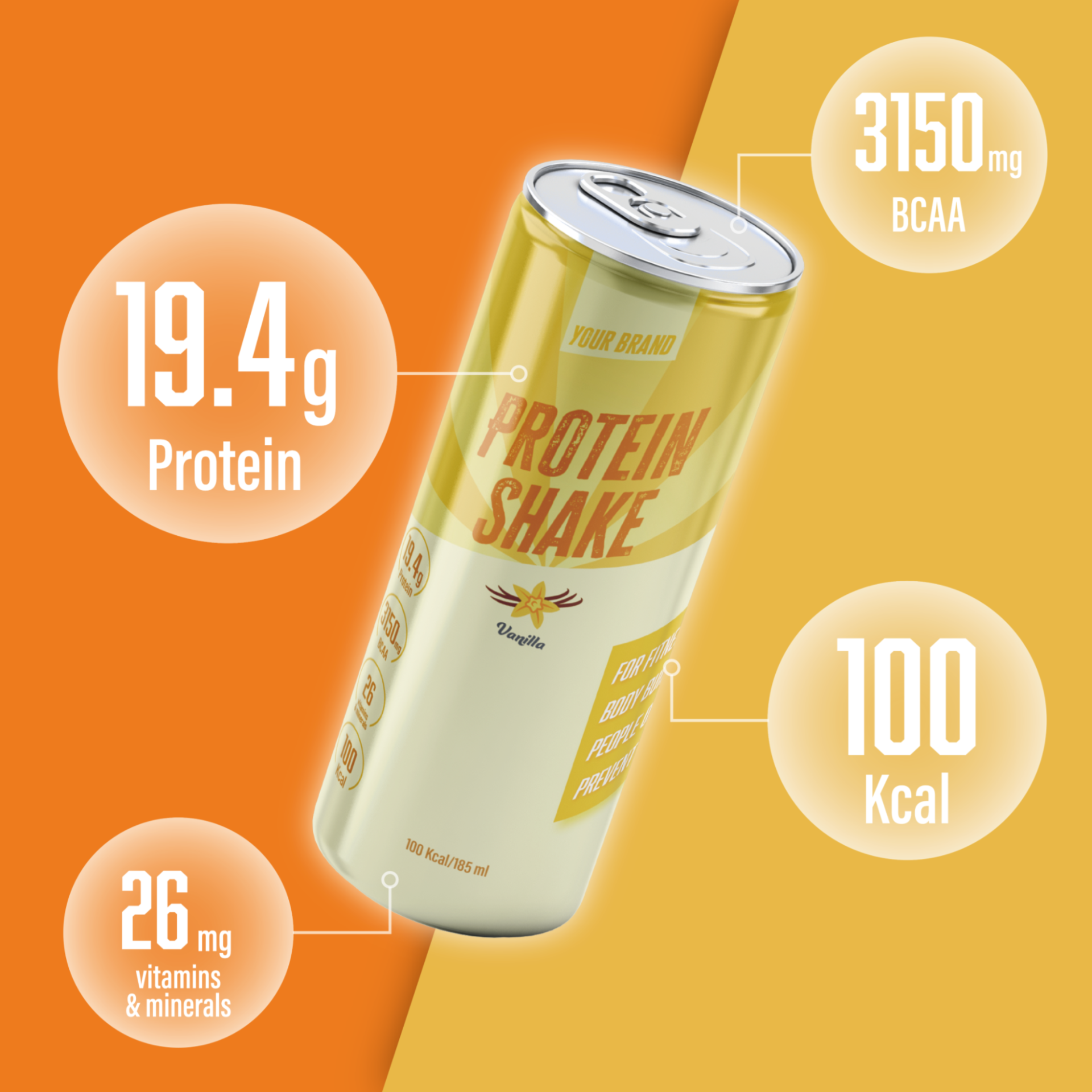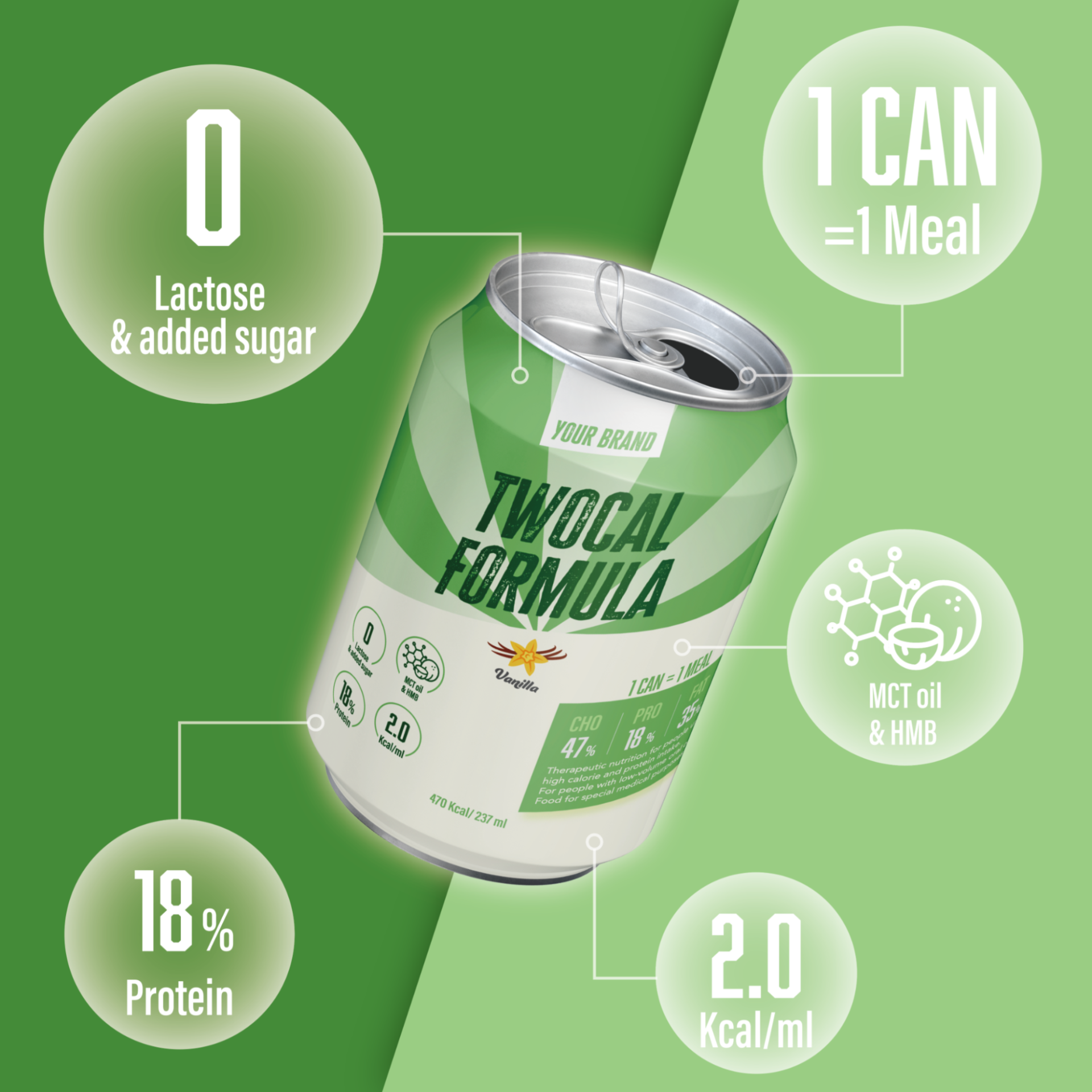Latest
News
What Post-Surgery Supplements to Take and Which to Avoid?

Surgery places significant stress on the body, depleting its protein and micronutrient reserves. So, healing requires more than just rest. The patient will need proper nutrition, including well-chosen supplements, after surgery for recovery support.
To help you make informed choices, we will explore safety precautions, introduce common post-surgery supplements based on scientific evidence, and ingredients to avoid for effective healing, as well as the best practices that may aid in post-op recovery.
Why Do Patients Take Post-Surgery Supplements?
Patients take post-surgery supplements to replenish lost nutrients, support wound healing, and maintain their immune system. Let’s dive further into these reasons:
-
Replenish Lost Nutrients: Blood loss and tissue damage can lead to deficiencies in essential nutrients like iron, zinc, vitamin C, and protein. The body’s nutrient demands will also increase after surgery as it works to repair tissue, fight infection, and regain strength. Yet, many patients may experience reduced appetite and find it hard to fill these nutritional gaps with food, which is why they might choose to have supplements to heal faster after surgery.
-
Support Wound Healing: Our body relies on collagen to form scar tissue on wounds. [1] By replenishing nutrients through supplements, patients can provide their bodies with the resources for collagen synthesis, supporting new skin formation and recovery on the surgical site.
-
Maintain the Immune System: Nutritional deficiencies after surgery could temporarily weaken the body’s immune response. [2] This increases the risk of infections and other complications. With the support of the right supplements, patients can support their immune system and lower these risks to recover more smoothly.
Important Precautions for Pre-/Post-Surgery Supplements
Healthcare professionals can help you choose the best post-surgery supplements based on your personal health condition and recovery protocol. Always consult your doctor or a registered dietitian before taking any supplements pre- or post-surgery. Do not decide which supplements to have on your own since certain supplements can interact dangerously with medications or even lead to side effects.
Also, always choose certified supplements that have scientifically proven benefits. The certification serves as quality assurance, ensuring that the supplements are both safe and effective for your healing journey.
What Supplements to Take After Surgery: Common Examples
Now, we’ll introduce some common supplements for surgery recovery, along with whole food options and typical dosage suggestions.
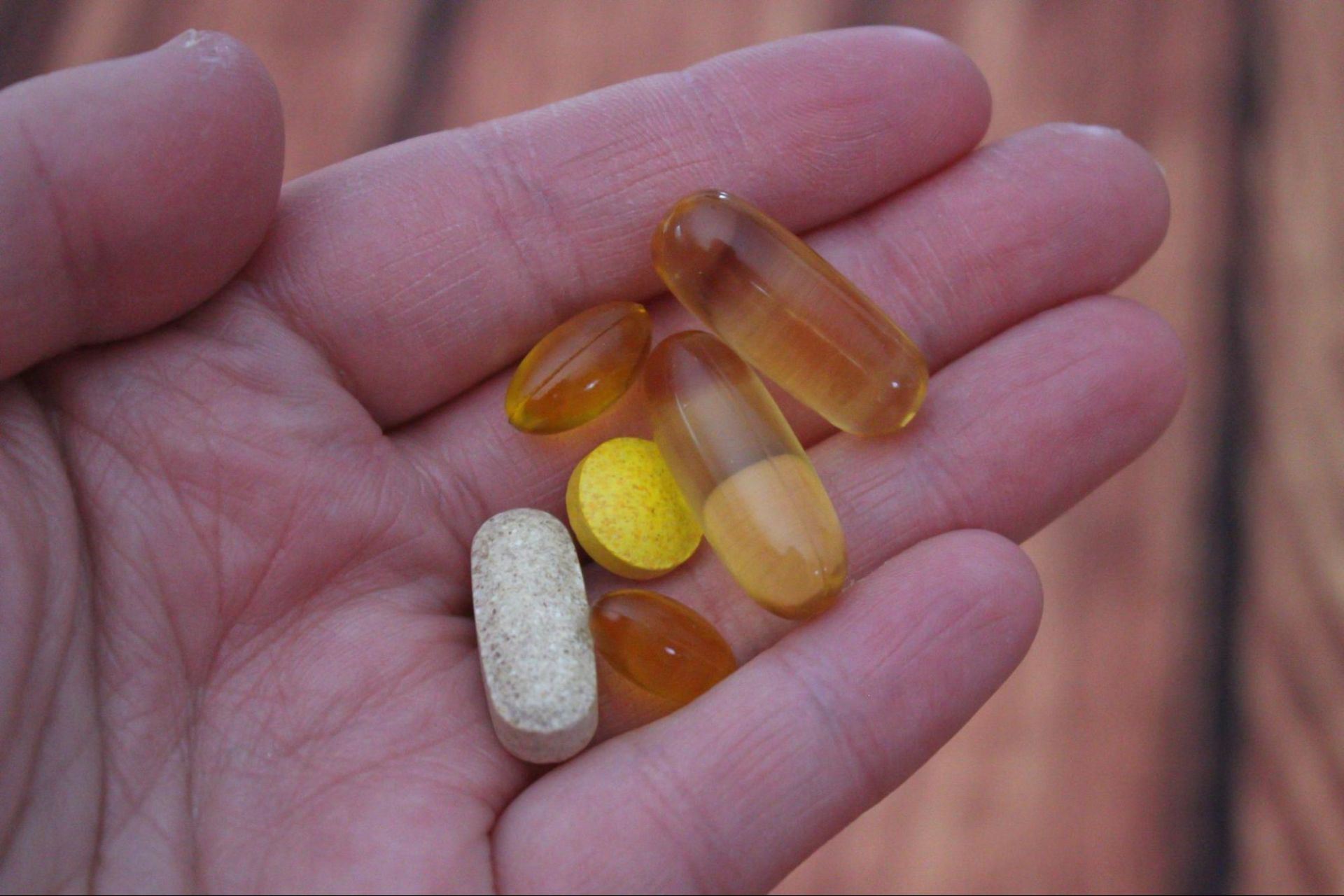
Source: Kayla Maurais on Unsplash
Vitamins
Vitamins are split into two groups: water-soluble (like vitamins C and B), which are not stored and must be taken regularly, and fat-soluble (like vitamins A and D), which are stored in the body and can build up. Doctors may recommend taking vitamin C, vitamin D, vitamin B complex, and vitamin A as supplements for healing after surgery.
Vitamin C
Known for its antioxidant properties, vitamin C is essential for the production of collagen [3], the element that forms the skin structure, scar tissue, blood vessels, and other connective tissues. It also helps reduce inflammation and supports immune defense during surgery recovery. [4] This nutrient can be found in foods like citrus fruits, kiwi, strawberries, bell peppers, and broccoli.
As a post-surgery supplement, the dosage for vitamin C typically ranges from 500 to 1,000 mg daily, taken after a meal. While the body may excrete the excess since it’s a water-soluble vitamin, patients should still avoid taking doses above 2,000 mg since it may cause digestive discomfort.
Vitamin D
Vitamin D supports calcium absorption for bone healing and immune regulation, allowing patients to improve their overall strength. [5] [6] It can be obtained from sunlight exposure, as well as foods like fatty fish, egg yolks, and fortified dairy products.
The dosage of Vitamin D supplements is often recommended at 1,000-2,000 IU (International Units) daily. It’s also best taken with meals containing healthy fats to help with absorption (since it’s fat-soluble) in the morning or at noon. Excessive intake may lead to toxicity, so do not take doses over 4,000 IU unless prescribed.
Vitamin B Complex
This group of vitamins, particularly B1, B6, and B12, helps convert the food you eat into energy, helping patients combat post-op fatigue and supporting nerve function. [7] [8] It even helps with new red blood cell formation to deliver oxygen to your healing tissues. [9] Foods that offer Vitamin B include whole grains, poultry, fish, eggs, beans, and leafy greens.
In the form of supplements, vitamin B complex is generally taken once daily with breakfast. Just be careful, high doses of certain B vitamins, like B3, can sometimes cause side effects with medications. Always check your supplement label for safe, balanced amounts, based on your doctor’s recommendation.
Vitamin A
Vitamin A is another nutrient that promotes collagen formation for tissue repair, helping wounds close properly. [10] Its natural sources include carrots, sweet potatoes, spinach, and liver.
The typical vitamin A supplement dose is 3,000 IU for adult men and 2,333 IU for adult women. It’s also best taken with a meal containing fat since it’s fat-soluble. Avoid high doses of over 10,000 IU unless prescribed, as excessive intake may cause toxicity, especially for pregnant women.
Minerals and Trace Elements
Minerals and trace elements are inorganic substances that your body needs. Among them, zinc, iron, magnesium, and calcium are commonly prescribed as healing supplements after surgery.
Zinc
Zinc is necessary for cell growth and division, which is what your body does when it creates new tissue to close an incision, making it a powerhouse mineral for wound healing. [11] It can be found in oysters, beef, pork, chicken, beans, nuts, and fortified cereals.
The usual dosage for this supplement is 8-11 mg per day, usually taken after meals. Do not take more than the prescribed amount, as taking too much zinc can interfere with copper absorption or cause nausea.
Iron
Iron supports the body to make hemoglobin, the protein in red blood cells that carries oxygen to all your tissues, including the surgical site. This makes it vital to keep a patient’s energy levels up and ensure proper healing. [12] Iron-rich foods include red meat, poultry, fish, beans, and fortified cereals.
As a surgery recovery supplement, iron is commonly taken in doses of 18-30 mg daily. It is best on an empty stomach or with vitamin C to improve absorption. However, patients with a sensitive digestive system may experience an upset stomach. If so, they can take it after a small meal.
Magnesium
Magnesium is involved in a lot of processes within our bodies. For instance, it supports muscle relaxation, nerve function, and bone health [13] [14], all of which are important when recovering from surgery. The mineral is found naturally in nuts, seeds, leafy greens, and whole grains
A typical magnesium supplement dose is 200-400 mg daily, preferably at night since it may promote relaxation or mild drowsiness. Nevertheless, excess magnesium can cause diarrhea, so do not go over the suggested dosage or start with smaller doses to see the body’s reaction.
Calcium
Essential for building and maintaining strong bones, calcium is particularly important after surgery, especially for orthopedic or dental procedures. [15] Foods that contain this nutrient include dairy products, tofu, leafy greens, and fortified plant-based milks.
Post-surgery supplements like Calcium Citrate are often split into smaller doses of 500-600 mg and taken a few times throughout the day, usually with meals. It’s also often paired with vitamin D, which helps the body absorb it. Also, avoid taking calcium at the same time as iron supplements, as they can interfere with each other’s absorption.
Protein and Amino Acids
Protein is the primary building block for almost everything in your body. It's made up of smaller units called amino acids. Doctors may ask patients to replenish protein and amino acids to replenish these nutrients through surgery recovery supplements like arginine, glutamine, leucine, and collagen peptides.
Arginine
Arginine (L-Arginine) supports blood flow by producing nitric oxide within the body, helping bring the necessary nutrients and oxygen to the surgical site for wound healing. [16] It is naturally found in turkey, chicken, peanuts, and soybeans.
The supplement is commonly taken in doses of 3-6 grams per day, divided into three smaller doses throughout the day, usually on an empty stomach for better absorption. Due to the risk of triggering flare-ups, patients with an active infection or certain heart conditions may have to take smaller doses.
Glutamine
Glutamine (L-Glutamine) is the most common amino acid in the body. It is a fuel source for immune cells and the cells lining the gut, helping patients fight off infection and supporting the structure of body tissues. [17] [18] It’s found in foods like eggs, beef, and dairy.
The typical dosage of Glutamine supplements is 5-10 grams daily, taken after meals. While generally safe at these doses, individuals with liver disease, metabolic issues, or certain seizure disorders should avoid it.
Leucine
Leucine helps stimulate muscle protein synthesis. [19] As it breaks down into HMB (beta-hydroxy-beta-methylbutyrate) within the body, it helps prevent muscle loss during recovery. Foods that have leucine include chicken, fish, dairy, and soy.
As a post-surgery supplement, it’s often taken at 2-3 grams per day, ideally 3 times throughout the day after meals to keep levels steady. Some doctors may suggest taking leucine with other branched-chain amino acids (BCAAs) to enhance its effects.
Collagen Peptides
Collagen is the main structural protein in your body, forming the framework for skin, joints, and bones. [20] Taking collagen in an easily digestible form called "peptides" provides your body with the amino acids it needs to quickly synthesize new collagen at the surgical site. Collagen-rich foods include bone broth, chicken skin, and fish.
The typical dosage for collagen peptide supplements is 10-15 grams daily, and it can be taken at any time of the day. Patients can also combine collagen with vitamin C for better absorption. This supplement is generally safe to have, but if the patient has a known allergy to the source (e.g., marine or bovine collagen), they can discuss it with their healthcare provider to choose an alternative.
Herbal Extracts & Natural Compounds
After surgery, some patients choose to use supplements derived from plants or microorganisms to help manage common side effects like swelling, bruising, and digestive upset from medications. Common options include bromelain, arnica, probiotics, curcumin, and nux vomica, which should still be taken under a doctor’s supervision.
Bromelain
Bromelain is an enzyme found in pineapples. It’s believed to reduce inflammation and swelling, which can, in turn, help tone down pain after a surgery. [21]
It may be taken in tablet form 3 times daily, ideally on an empty stomach (at least 30 minutes before a meal or 2 hours after a meal), but it should be avoided if the patient is allergic to pineapple or taking blood thinners.
Arnica
Arnica montana, also known as wolfsbane, is a flower extract. It is often used to manage bruising, swelling, and muscle soreness. [22]
It can be taken orally or applied as a cream (but never on open wounds). The typical oral supplement dosage is 4 small tablets under the tongue, 3 times daily. The oral supplement is highly diluted, as high doses of the unprocessed herb itself can be toxic if consumed in large quantities.
Probiotics
Probiotics are live microorganisms that help restore the healthy balance of bacteria in our digestive system. This is especially helpful if the patients are taking antibiotics after surgery, which can disrupt the gut and cause discomfort. [23] Probiotic-rich foods include yogurt, kefir, kimchi, sauerkraut, and miso.
In the form of supplements, the probiotics dosage varies by product, but patients typically have 1 capsule or serving daily. It is often recommended to be taken during a meal or according to the product label, ideally a few hours apart from when the antibiotic is taken. Just make sure to choose clinically verified strains and store them properly to maintain potency.
Curcumin
Curcumin is an active compound in the spice turmeric. It may help reduce inflammation and oxidative stress after surgery for a smoother recovery. [24]
The supplement dosage typically ranges from 500 mg to 1,000 mg daily with meals, often with a formulation that includes black pepper (piperine) to help the body absorb it better. Even so, patients may have to avoid it if they take anticoagulants or have gallbladder issues.
Nux Vomica
Nux vomica, or poison nut, is a seed extract. It is sometimes used to ease the unpleasant side effects of general anesthesia and other medications, such as nausea, fatigue, or the feeling of discomfort. [25]
The usual supplement dosage is 4 small tablets under the tongue, 3 times daily. Like most plant extracts, it should be used only under professional guidance, as excessive intake may be toxic.
Post-Surgery Recovery Supplement Examples at a Glance
For a quick review, we’ve compiled a table for all the supplements mentioned earlier. Bear in mind that this is just a reference. Always consult a healthcare professional when deciding on suitable supplements and the exact dosages.
|
Category |
Supplement |
Purpose |
Usual Dosage |
Whole Food Sources |
|
Vitamins |
Vitamin C |
Supports collagen production and immune defense. |
500-1,000 mg daily. |
Citrus fruits, kiwi, strawberries, bell peppers, broccoli. |
|
Vitamin D |
Supports calcium absorption and immune regulation. |
1,000-2,000 IU daily. |
Fatty fish, egg yolks, fortified dairy products. |
|
|
Vitamin B Complex |
Converts food into energy. Also supports nerve function and red blood cell formation. |
Once daily with breakfast. |
Whole grains, poultry, fish, eggs, beans, leafy greens. |
|
|
Vitamin A |
Promotes collagen formation. |
Men: 3,000 IU; |
Carrots, sweet potatoes, spinach, liver. |
|
|
Minerals & Trace Elements |
Zinc |
Supports cell growth and division. |
8-11 mg per day. |
Oysters, beef, pork, chicken, beans, nuts, fortified cereals. |
|
Iron |
Promotes hemoglobin formation. |
18-30 mg daily. |
Red meat, poultry, fish, beans, fortified cereals. |
|
|
Magnesium |
Supports muscle relaxation, nerve function, and bone health. |
200-400 mg daily. Take at night. |
Nuts, seeds, leafy greens, whole grains |
|
|
Calcium |
Maintain bone health. |
500-600 mg per dose. |
Dairy products, tofu, leafy greens, fortified plant-based milks. |
|
|
Protein & Amino Acids |
Arginine |
Supports blood flow (nitric oxide production). |
3-6 grams per day, divided into 3 smaller doses. |
Turkey, chicken, peanuts, soybeans. |
|
Glutamine |
Maintains immune cells and gut lining. |
5-10 grams daily. |
Eggs, beef, dairy. |
|
|
Leucine |
Stimulates muscle growth. |
2-3 grams per day, divided into 3 times. |
Chicken, fish, dairy, soy. |
|
|
Collagen Peptides |
Promotes collagen synthesis. |
10-15 grams daily. |
Bone broth, chicken skin, fish. |
|
|
Herbal Extracts & Natural Compounds |
Bromelain |
Potentially reduces inflammation and swelling to ease pain. |
Varies by product, typically 3 tablets 3 times daily on an empty stomach. |
Pineapple (stem and core). |
|
Arnica |
May manage bruising, swelling, and muscle soreness. |
4 small tablets 3 times daily. |
No available food source (the herb is toxic if consumed raw). |
|
|
Probiotics |
Potentially restores healthy gut bacteria and counteracts antibiotic side effects. |
Varies by product, typically 1 serving daily. |
Yogurt, kefir, kimchi, sauerkraut, miso. |
|
|
Curcumin |
May reduce inflammation and oxidative stress. |
500-1,000 mg daily. |
Turmeric spice. |
|
|
Nux Vomica |
Potentially ease nausea, fatigue, and discomfort from anesthesia/medications. |
4 small tablets 3 times daily. |
No available food source (the seed is toxic if consumed on its own). |
What Supplements to Avoid Before/After Surgery?
While certain supplements can support healing, others can interfere with anesthesia, blood clotting, or prescribed medications. Therefore, it’s important not to take any of these supplements before or after surgery unless approved by your healthcare provider.
Here are common supplements that should be discontinued before surgery to ensure safe healing and reduce complications:
-
Vitamin E: Usually taken for its antioxidant and skin benefits, vitamin E can thin the blood and increase the risk of bleeding during and after surgery [26], so patients should stop taking it at least 2 weeks before surgery.
-
Fish Oil/Omega-3 Supplements: Found in fish oil and flaxseed oil, omega-3 fatty acids support heart and brain health but also inhibit platelet function, making it harder for blood to clot. [27] This is why patients should discontinue them 2 weeks before surgery.
-
Ginkgo Biloba: Known for improving circulation and memory, this herb can also thin the blood and raise the risk of excessive bleeding. [28] It is recommended to stop having them 2 weeks before surgery.
-
Garlic Supplements: While culinary garlic is fine, concentrated garlic pills can act as natural blood thinners and interfere with blood pressure medications [29], so patients should avoid taking them for 1 week before surgery.
-
Grape Seed Extract: Often used for antioxidant and cardiovascular benefits, grape seed extract can affect platelet aggregation and increase bleeding risk. [30] It may be best to stop having them 1-2 weeks before surgery.
-
Green Tea Extract: Though green tea supports metabolism and antioxidant activity, its caffeine content and vitamin K can affect anesthesia and blood clotting. [31] Patients should stop having them at least 1 week before surgery.
-
Ginseng: Commonly used to boost energy and immunity, ginseng can alter blood pressure and blood sugar levels, [32] potentially disrupting surgical outcomes. Patients may be recommended to stop taking them 1 week before surgery.
-
St. John’s Wort: A herbal remedy for mood support, St. John’s Wort can interfere with anesthesia and pain medications, reducing their effectiveness or causing unpredictable reactions. [31] So, they may need to be avoided for 2 weeks before surgery.
-
Feverfew: Used to relieve migraines, feverfew can increase bleeding when combined with other blood-thinning agents. [33] Patients may have to stop taking them 2 weeks before surgery.
-
Kava Kava and Valerian Root: These herbs may promote relaxation and better sleep, but can dangerously intensify the sedative effects of anesthesia and pain relievers. [31] This is why patients should avoid them for at least 1 week before surgery.
As we can see, even natural supplements can pose risks during the surgical period. With this in mind, patients should always disclose everything they take, including vitamins, herbal teas, and over-the-counter remedies, to their doctor well before the procedure to ensure the safest possible recovery.
 Source: Freepik
Source: Freepik
Timing for Pre-/Post-Surgery Supplements
The body’s nutritional needs change at every stage of surgery and recovery. It’s important to monitor recovery progress and adjust the supplement plan accordingly under the doctor’s guidance.
-
Pre-Op: Focus on building nutritional reserves. A balanced intake of protein supplements, like arginine, and vitamins C and D can strengthen tissues and prepare the body for surgery.
-
Immediate Post-Op: Support initial healing and reduce inflammation. At this stage, glutamine, zinc, and vitamin C help with wound repair and maintain immune health.
-
Mid-Recovery: Concentrate on muscle rebuilding and tissue growth. Leucine and collagen peptides are ideal for this phase to restore strength and improve tissue repair.
-
Long-Term Recovery: Just keep on maintaining the results and overall well-being. Continue collagen peptides and multivitamins to support scar healing and get sustained energy.
What Else Can Patients Do to Support Post-Op Recovery?

Source: Freepik
Supplements play a key role in helping your body heal, but recovery goes far beyond what’s in the pill organizer. Daily habits, like eating healthy, sleeping well, and maintaining physical movement, can significantly improve healing and surgical results.
Here are some simple yet powerful ways to support the body after surgery:
-
Prepare Nutrient-Rich Mini-Meals: After surgery, appetite may be low. Instead of having typical food portions, prepare small meals in advance using protein-packed foods like eggs, yogurt, tofu, and lentils. Then, have these small meals multiple times throughout the day for a steady supply of nutrients and energy.
-
Stay Hydrated: Aim for 8-10 glasses (about 64 to 80 ounces) of water daily to promote circulation and deliver nutrients to the wound. [34] Some people may even choose to add a squeeze of lemon or a pinch of sea salt for added electrolytes.
-
Incorporate Gentle Movements: Once cleared by the doctor, start gentle activity like light walks or stretches. Movement encourages blood flow, preventing stiffness or blood clots. [35]
-
Use Sun Protection: Newly formed surgical incisions are extremely sensitive to UV rays. Sun exposure can cause scars to become dark, raised, or permanently discolored. Use a medical-grade sunscreen or wear UPF clothing over healing areas for at least 6 to 12 months to prevent this issue.
-
Sleep in Elevated Positions: Keeping the surgical area elevated, especially during the first few weeks, can reduce swelling and improve comfort. [36] Use supportive pillows to keep the head or body slightly raised as advised for the specific procedure.
-
Support the Lymphatic System: The lymphatic system is responsible for removing excess fluid and waste that cause swelling. When approved by your surgeon, try gentle lymphatic massage and wearing specialized compression garments to further prevent fluid buildup.
-
Manage Stress Levels: High stress causes the body to release hormones like cortisol, which can increase inflammation and slow down healing. [37] Practice deep breathing, short meditations, or guided imagery to keep the mind calm and focused on recovery.
-
Avoid Alcohol, Smoking, and Salty Foods: Smoking severely restricts blood flow [38], which starves healing tissues of oxygen and nutrients. Alcohol can dangerously interact with medications [39], while salty foods may dehydrate the body and worsen swelling [40]. As such, avoid these habits before and after the surgery, at least until the body is fully recovered.
More Pre-/Post-Surgery Supplements FAQs
Q1. When should I start having surgery recovery supplements?
Most patients can begin having surgery recovery supplements about 24-48 hours after the procedure, once they can tolerate food and fluids. Always confirm with the doctor before starting, as timing may vary depending on the surgery type and individual healing needs.
Q2. How long should I continue to take healing supplements after surgery?
It’s usually best to continue supplements for at least 4-6 weeks after surgery, when the body’s tissue repair is most active. Some nutrients, like collagen or vitamin C, may be continued longer, about 8 weeks, to support scar healing. Nonetheless, the patient should follow their healthcare provider’s guidance for a gradual transition back to their daily regimen.
Q3. Can I have my usual supplements or medications after surgery?
For prescription medications, most patients are instructed to continue their usual routine. However, patients on blood thinners or diabetic medication may require temporary dosage adjustments. The surgeon or nursing staff will clarify these specific instructions before the patients are discharged.
For regular vitamins and supplements, do not resume the full pre-surgery regimen immediately. At least wait 24-48 hours according to professional advice, then prioritize the specialized recovery supplements for the first month or two, as the body's nutritional needs are entirely focused on healing.
Grace Biotech: High-Quality Post-Surgery Supplement Solutions
As you explore the best supplements post-surgery for your personal recovery, always remember to consult your healthcare provider or dietitian to choose the protocol that is safest and most effective for you.
For healthcare brands looking to create post-op solutions, Grace Biotech is a trusted supplement manufacturer that delivers high-quality nutrition. By leveraging our formulation expertise and adhering to global manufacturing standards, we offer supplements that are gentle yet effective. These supplements also come in convenient, ready-to-drink formats that ensure fast absorption and easy consumption when a patient’s appetite is low.
Some of our post-surgery supplement solutions include:
|
|
Complete & Balanced Formula A ready-to-drink nutritional shake with high-quality protein, essential fats, carbohydrates, and 27 vitamins and minerals. Suitable as a meal replacement or snack, including for patients with dysphagia or those on tube feeding.
|
|
|
Protein Shake Enriched with branched-chain amino acids, this shake supports muscle maintenance, repair, and overall protein needs. Ideal for patients with poor appetite or on a liquid diet, as well as pre- and post-exercise nutrition.
|
|
|
Twocal Formula A concentrated liquid supplement providing 2 kcal/mL and high protein content. Supports weight gain, lean body mass preservation, and wound healing, making it suitable for surgery recovery, malnutrition, or chronic illness.
|
Partner with us today to deliver safe, effective, and patient-friendly supplements.
Resources:
[1] Shomita S Mathew-Steiner, Sashwati Roy, Chandan K Sen. Collagen in Wound Healing. Bioengineering (Basel). 2021 May 11. doi: 10.3390/bioengineering8050063.
[2] Camelia Munteanu, Betty Schwartz. The relationship between nutrition and the immune system. Front Nutr. 2022 Dec 8. doi: 10.3389/fnut.2022.1082500.
[3] Nicholas N DePhillipo, Zachary S Aman, Mitchell I Kennedy, JP Begley, Gilbert Moatshe, Robert F LaPrade. Efficacy of Vitamin C Supplementation on Collagen Synthesis and Oxidative Stress After Musculoskeletal Injuries: A Systematic Review. Orthop J Sports Med. 2018 Oct 25. doi: 10.1177/2325967118804544.
[4] Anitra C Carr, Silvia Maggini. Vitamin C and Immune Function. Nutrients. 2017 Nov 3. doi: 10.3390/nu9111211.
[5] Jacob M. Johnson, Simbarashe J. Peresuh, Manjot Singh, Jeffrey Okewunmi, Michel A. Arcand, Joseph A. Gil. The role of vitamin D in fracture healing: Insights from basic science, clinical studies, and future directions. Journal of Orthopaedic Reports. 2025 Aug 6. doi: 10.1016/j.jorep.2025.100759.
[6] Pieter-Jan Martens, Conny Gysemans, Annemieke Verstuyf, Chantal Mathieu. Vitamin D’s Effect on Immune Function. Nutrients. 2020 Apr 28. doi: 10.3390/nu12051248.
[7] Mon-Chien Lee, Yi-Ju Hsu, Sih-Yu Shen, Chin-Shan Ho, Chi-Chang Huang. A functional evaluation of anti-fatigue and exercise performance improvement following vitamin B complex supplementation in healthy humans, a randomized double-blind trial. Int J Med Sci. 2023 Aug 15. doi: 10.7150/ijms.86738.
[8] Simone Baltrusch. The Role of Neurotropic B Vitamins in Nerve Regeneration. Biomed Res Int. 2021 Jul 13. doi: 10.1155/2021/9968228.
[9] Jarosław Krzywański, Tomasz Mikulski, Andrzej Pokrywka, Marcel Młyńczak, Hubert Krysztofiak, Barbara Frączek, Andrzej Ziemba. Vitamin B12 Status and Optimal Range for Hemoglobin Formation in Elite Athletes. Nutrients. 2020 Apr 9. doi: 10.3390/nu12041038.
[10] J Varani, R L Warner, M Gharaee-Kermani, S H Phan, S Kang, J H Chung, Z Q Wang, S C Datta, G J Fisher, J J Voorhees. Vitamin A antagonizes decreased cell growth and elevated collagen-degrading matrix metalloproteinases and stimulates collagen accumulation in naturally aged human skin. J Invest Dermatol. 2000 Mar. doi: 10.1046/j.1523-1747.2000.00902.x.
[11] MacDonald Ruth S. The Role of Zinc in Growth and Cell Proliferation. The Journal of Nutrition. 2000 May. doi: 10.1093/jn/130.5.1500S.
[12] Margreet Schoorl, Marianne Schoorl, Derek van der Gaag, Piet C M Bartels. Effects of iron supplementation on red blood cell hemoglobin content in pregnancy. Hematol Rep. 2012 Nov 28. doi: 10.4081/hr.2012.e24.
[13] Ghizal Fatima, Andrej Dzupina, Hekmat B Alhmadi, Aminat Magomedova, Zainab Siddiqui, Ammar Mehdi, Najah Hadi. Magnesium Matters: A Comprehensive Review of Its Vital Role in Health and Diseases. Cureus. 2024 Oct 13. doi: 10.7759/cureus.71392.
[14] Mariangela Rondanelli, Milena Anna Faliva, Alice Tartara, Clara Gasparri, Simone Perna, Vittoria Infantino, Antonella Riva, Giovanna Petrangolini, Gabriella Peroni. An update on magnesium and bone health. Biometals. 2021 May 6. doi: 10.1007/s10534-021-00305-0.
[15] Looker Anne C. Interaction of Science, Consumer Practices and Policy: Calcium and Bone Health as a Case Study. The Journal of Nutrition. 2003 Jun. doi: 10.1093/jn/133.6.1987S.
[16] Mega Obukohwo Oyovwi, Adedeji David Atere. Exploring the medicinal significance of l-Arginine mediated nitric oxide in preventing health disorders. European Journal of Medicinal Chemistry Reports. 2024 Dec. doi: 10.1016/j.ejmcr.2024.100175.
[17] Vinicius Cruzat, Marcelo Macedo Rogero, Kevin Noel Keane, Rui Curi, Philip Newsholme. Glutamine: Metabolism and Immune Function, Supplementation and Clinical Translation. Nutrients. 2018 Oct 23. doi: 10.3390/nu10111564.
[18] Brett J. Deters, Mir Saleem. The role of glutamine in supporting gut health and neuropsychiatric factors. Food Science and Human Wellness. 2021 Mar. doi: 10.1016/j.fshw.2021.02.003.
[19] Zhe-rong Xu, Zhong-ju Tan, Qin Zhang, Qi-feng Gui, Yun-mei Yang. The effectiveness of leucine on muscle protein synthesis, lean body mass and leg lean mass accretion in older people: a systematic review and meta-analysis. Br J Nutr. 2015 Jan 14. doi: 10.1017/S0007114514002475.
[20] Luana Dias Campos, Valfredo de Almeida Santos Junior, Júlia Demuner Pimentel, Gabriel Lusi Fernandes Carregã, Cinthia Baú Betim Cazarin. Collagen supplementation in skin and orthopedic diseases: A review of the literature. Heliyon. 2023 Mar 28. doi: 10.1016/j.heliyon.2023.e14961.
[21] Vidhya Rathnavelu, Noorjahan Banu Alitheen, Subramaniam Sohila, Samikannu Kanagesan, Rajendran Ramesh. Potential role of bromelain in clinical and therapeutic applications. Biomed Rep. 2016 Jul 18. doi: 10.3892/br.2016.720.
[22] Amanda G Smith, Victoria N Miles, Deltrice T Holmes, Xin Chen, Wei Lei. Clinical Trials, Potential Mechanisms, and Adverse Effects of Arnica as an Adjunct Medication for Pain Management. Medicines (Basel). 2021 Oct 9. doi: 10.3390/medicines8100058.
[23] Gregor Reid. Probiotics to Prevent the Need For, and Augment the Use Of, Antibiotics. Can J Infect Dis Med Microbiol. 2006 Sep-Oct. doi: 10.1155/2006/934626.
[24] Mohammad Jafar Dehzad, Hamid Ghalandari, Mehran Nouri, Moein Askarpour. Antioxidant and anti-inflammatory effects of curcumin/turmeric supplementation in adults: A GRADE-assessed systematic review and dose–response meta-analysis of randomized controlled trials. Cytokine. 2023 Apr. doi: 10.1016/j.cyto.2023.156144.
[25] Stuti R. Navigating Anesthesia with Homoeopathy: A Holistic Approach to Perioperative Care. Ann Clin Case Rep. 2024; 9: 2574. ISSN: 2474-1655.
[26] P Dowd, Z B Zheng. On the mechanism of the anticlotting action of vitamin E quinone. Proc Natl Acad Sci U S A. 1995 Aug 29. doi: 10.1073/pnas.92.18.8171.
[27] Reheman Adili, Megan Hawley, Michael Holinstat. Regulation of platelet function and thrombosis by omega-3 and omega-6 polyunsaturated fatty acids. Prostaglandins Other Lipid Mediat. 2019 Nov 1. doi: 10.1016/j.prostaglandins.2018.09.005.
[28] George B Kudolo, Sheryl Dorsey, Janet Blodgett. Effect of the ingestion of Ginkgo biloba extract on platelet aggregation and urinary prostanoid excretion in healthy and Type 2 diabetic subjects. Thrombosis Research. 2002 Nov. doi: 10.1016/S0049-3848(02)00394-8.
[29] Christopher Sleiman, Rose-Mary Daou, Antonio Al Hazzouri, Zahi Hamdan, Hilda E Ghadieh, Bernard Harbieh, Maya Romani. Garlic and Hypertension: Efficacy, Mechanism of Action, and Clinical Implications. Nutrients. 2024 Aug 29. doi: 10.3390/nu16172895.
[30] Somia Attaelseed Hassan, Zeinab S A Alsayed, Mohamed Mobarak Elbasheir, Wala Eldin Osma Elradi, Elharam Ibrahim Abdallah Ibrahim, Aadil Yousif Elmahi. In vitro Anticoagulant Effect of Grape Seed Extract (Vitis vinifera) on Human Normal Blood Sample. European Journal of Medicinal Plants. 2020 Nov. doi: :10.9734/ejmp/2020/v31i1630329.
[31] Ofelia Loani Elvir Lazo, Paul F. White, Carol Lee, Hillenn Cruz Eng, Jenna M. Matin, Cory Lin, Franklin Del Cid, Roya Yumul. Use of herbal medication in the perioperative period: Potential adverse drug interactions. Journal of Clinical Anesthesia. 2024 Aug. doi: 10.1016/j.jclinane.2024.111473.
[32] Jong Dae Park. Metabolism and drug interactions of Korean ginseng based on the pharmacokinetic properties of ginsenosides: Current status and future perspectives. Journal of Ginseng Research. 2024 May. doi: 10.1016/j.jgr.2024.02.003.
[33] Khalidah A Alenzi, Fasil H Alharbi, Fasil M Tawhari, Ghada S Fradees. Alteration of Coagulation Test Results and Vaginal Bleeding Associated With the Use of Feverfew (Tanacetum parthenium). J Med Cases. 2020 Nov 18. doi: 10.14740/jmc3601.
[34] Joseph C Watso, William B Farquhar. Hydration Status and Cardiovascular Function. Nutrients. 2019 Aug 11. doi: 10.3390/nu11081866.
[35] Masahiro Horiuchi, Koichi Okita. Blood Flow Restricted Exercise and Vascular Function. Int J Vasc Med. 2012 Oct 22. doi: 10.1155/2012/543218.
[36] Eni Purwanty, Riri Maria, Masfuri Masfuri. 20-Degree Elevation to Reduce Swelling and Pain After Lower Extremity Open Reduction and Internal Fixation Surgery. Jurnal Keperawatan Indonesia. 2021 Dec. doi: 10.7454/jki.v24i3.1000.
[37] Nare Amasi-Hartoonian, Luca Sforzini, Annamaria Cattaneo, Carmine Maria Pariante. Cause or consequence? Understanding the role of cortisol in the increased inflammation observed in depression. Curr Opin Endocr Metab Res. 2022 Jun. doi: 10.1016/j.coemr.2022.100356.
[38] Omar Hahad, Marin Kuntic, Ivana Kuntic, Andreas Daiber, Thomas Münzel. Tobacco smoking and vascular biology and function: evidence from human studies. Pflugers Arch. 2023 Mar 24. doi: 10.1007/s00424-023-02805-z.
[39] Ron Weathermon, David W Crabb. Alcohol and Medication Interactions. Alcohol Res Health. 1999;23(1):40–54.
[40] Nina S Stachenfeld. Acute Effects of Sodium Ingestion on Thirst and Cardiovascular Function. Curr Sports Med Rep. 2010 May 17. doi: 10.1249/JSR.0b013e31817f23fc.

